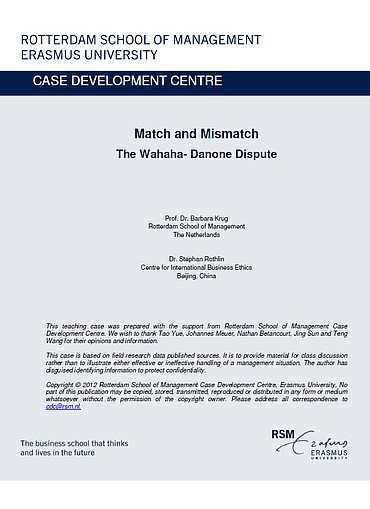Citation Note
Based on published sources; 14 pages.
Follow the 'handle' link to access the Case Study on RePub.
For EUR staff members: the Teaching Note is available on request, you can contact us at rsm.nl/cdc/contact/
For external users: follow the link to purchase the Case Study and the Teaching Note.
Objective
The purpose of this teaching case is to lead students to consider that in order to do business successfully in China, multinationals must align their interests with their Chinese counterparts rather than challenge or compete with them. This is especially important in a business environment like China where legal protection is weak. Though Danone and Wahaha are both responsible for the dispute, we suggest that a focus on Danone—what mistakes it made and what lessons it could draw from those mistakes—will give classroom discussion a clear angle and keep it under control. If the teacher wishes to let the class study and discuss Chinese business behaviour, he or she may also switch the focus to Wahaha.
description
Danone and its Chinese joint venture partner, Wahaha, were entangled in legal disputes over trademarks, which led to plummeting sales and fights about national economic security.
Abstract
China’s leading beverage company, Hangzhou Wahaha Group (Wahaha), and the French beverage giant, Groupe Danone (Danone), formed a strategic Joint Venture (JV) partnership in 1996. Within the next decade, Wahaha became China’s biggest beverage producer and the 5th largest worldwide, with annual sales of RMB 11.1 billion (US$1.4 billion). By 2006, 5%-6% of Danone’s global profits came from the JV and Wahaha was among its top 4 brands. Despite all this success, Danone and Wahaha became trapped in a complex and thorny relationship. A series of legal battles, accompanied by high-profile media wars, broke out in April 2007. The initial trademark transfer dispute escalated into fights about foreign monopoly, local protectionism and national economic security, which led to the presidents of both countries asking each party to find an amicable solution. Danone’s first half-year result for 2007 shows that its sales from the JV dropped by 6% compared to the same period in 2006, and its stocks plunged by 9% just over two months after its confrontation with Wahaha became public. How could a promising relationship turn bitter, and why? Given that for many multinationals China is an indispensable market, what lessons can they draw from the Danone-Wahaha dispute?
usage
The case deals with typical issues behind the failure of many joint ventures between Western multinationals and Chinese firms. It serves as a reference point for a host of debatable ethical, legal and economic questions, showing the importance for multinationals to align interests with their Chinese partners in a business environment where legal protection is weak.
